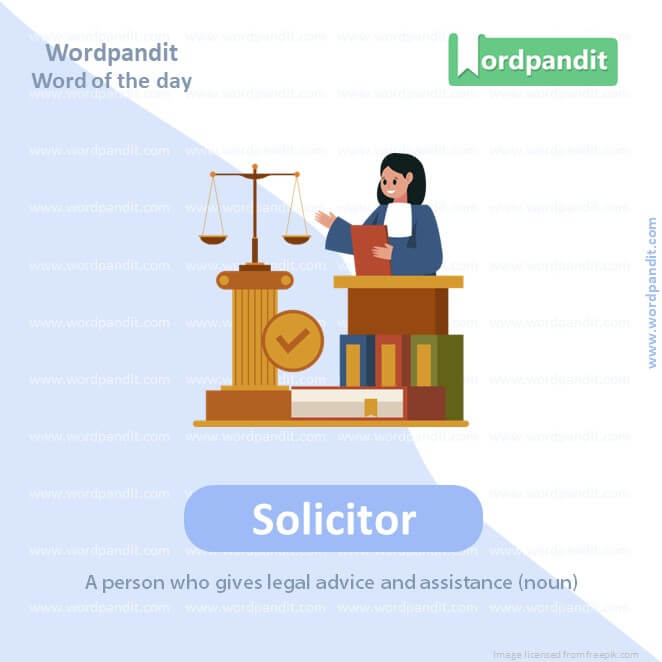Daily Vocabulary Words: List of Daily Used Words in Leading Indian Newspapers
Hi there. Welcome to this special section @ Wordpandit. Our endeavour here is straightforward: highlighting daily vocabulary words that you would come across in leading newspapers in the country. We have included the following newspapers in our selection:
• The Times of India
• The Economic Times
• Hindustan Times
• Mint
• Indian Express
We are putting in extensive work to develop your vocabulary. All you have to do is be regular with this section and check out this post daily. This is your repository of commonly used words; essentially, we are posting a list of daily used words. Hence, this has significant practical application as it teaches you words that are commonly used in leading publications mentioned above.
Visit the website daily to learn words from leading Indian newspapers.

WORD-1: EVASIVE
CONTEXT: Additional solicitor general S. V. Raju, appearing for the ED, said that the Aam Aadmi Party (AAP) supremo has been “non-cooperative” during the custody and has been “evasive” with the replies.
SOURCE: Hindustan Times
EXPLANATORY PARAGRAPH: Imagine you have a toy that you broke, and when someone asks if you did it, you avoid answering or try to change the subject. That’s being “evasive.” It means avoiding giving a direct answer or avoiding a difficult situation.
MEANING: Tending to avoid giving direct answers or not being caught (Adjective).
PRONUNCIATION: ih-VEY-siv
SYNONYMS: Dodging, avoiding, evading, shifty, elusive
USAGE EXAMPLE:
1. He was evasive when asked about his whereabouts last night.
2. The politician gave evasive answers during the interview.
3. The suspect’s evasive behavior raised suspicions.
4. She became evasive whenever the topic of her grades came up.

WORD-2: SOLICITOR
CONTEXT: Additional solicitor general S. V. Raju, appearing for the ED, said that the Aam Aadmi Party (AAP) supremo has been “non-cooperative” during the custody and has been “evasive” with the replies.
SOURCE: Hindustan Times
EXPLANATORY PARAGRAPH: Imagine you need help with a problem, so you ask your teacher or parent for advice. A person who gives legal advice and helps with legal matters is called a “solicitor.” They are like helpers who guide you through legal issues.
MEANING: A person who gives legal advice and assistance (noun).
PRONUNCIATION: suh-LIS-i-ter
SYNONYMS: Lawyer, attorney, advocate, counselor, legal adviser
USAGE EXAMPLE:
1. She hired a solicitor to handle her divorce proceedings.
2. The company consulted a solicitor before signing the contract.
3. The solicitor explained the legal implications of the document.
4. The solicitor helped the family with estate planning.
WORD-3: DELIBERATELY
CONTEXT: “He has deliberately not given passwords to the electronic devices,” Raju submitted.
SOURCE: Hindustan Times
EXPLANATORY PARAGRAPH: When you carefully plan and do something on purpose, like practicing a magic trick before showing it to your friends, you’re doing it “deliberately.” It means doing something intentionally or with careful thought.
MEANING: Doing something intentionally or with careful consideration (adverb).
PRONUNCIATION: dih-LIB-er-it-lee
SYNONYMS: Intentionally, purposefully, consciously, knowingly, with intent
USAGE EXAMPLE:
1. He deliberately chose not to answer the question.
2. She spoke deliberately, choosing each word with care.
3. The artist deliberately used bold colors to create contrast.
4. The decision was made deliberately after weighing all the options.

WORD-4: PETITION
CONTEXT: It is clarified that this court has not commented on the locus standi of the petition and the same is left open,” the court said in its order.
SOURCE: Hindustan Times
EXPLANATORY PARAGRAPH: Imagine you and your friends want a new playground, so you write a letter to the mayor asking for one. That letter asking for something specific is called a “petition.” It’s like making a formal request.
MEANING: A formal written request, typically signed by many people, appealing to authority with respect to a particular cause (noun).
PRONUNCIATION: puh-TISH-uhn
SYNONYMS: Request, appeal, plea, entreaty, application
USAGE EXAMPLE:
1. The petition collected thousands of signatures in support of environmental conservation.
2. The students submitted a petition to extend library hours.
3. The petition called for stricter penalties for animal cruelty.
4. The petition was successful in getting the city to repair the playground.
WORD-5: COERCIVE
CONTEXT: In a major relief to the Congress, the Income Tax department told the Supreme Court on Monday that it will not take any coercive action against the party till July 24, over its tax demands.
SOURCE: Hindustan Times
EXPLANATORY PARAGRAPH: Imagine someone is forcing you to share your toys with them, even though you don’t want to. That forceful or persuasive way of making someone do something is called “coercive.” It means using threats or force to make someone do something.
MEANING: Using threats or force to make someone do something (adjective).
PRONUNCIATION: koh-UR-siv
SYNONYMS: Forceful, threatening, intimidating, compelling, bullying
USAGE EXAMPLE:
1. The company used coercive tactics to pressure employees into working overtime.
2. Coercive measures were taken to ensure compliance with safety regulations.
3. The dictator ruled with a coercive grip on the population.
4. The coercive behavior of the salesperson made customers uncomfortable.
WORD-6: YARDSTICKS
CONTEXT: He said using the same yardsticks, the BJP was liable to pay ₹4600 crore in taxes.
SOURCE: Hindustan Times
EXPLANATORY PARAGRAPH: Imagine you have a measuring tape and use it to check how tall you are. A “yardstick” is like a measuring tool, but instead of measuring height, it’s used to measure how good or bad something is compared to a standard. It’s like a way to judge or evaluate things.
MEANING: A standard or criterion for measuring or evaluating something (noun).
PRONUNCIATION: yahrd-stik
SYNONYMS: Standard, criterion, benchmark, gauge, measure
USAGE EXAMPLE:
1. Customer satisfaction is often used as a yardstick for evaluating businesses.
2. The success of the project will be the yardstick for future endeavors.
3. Academic performance is a common yardstick for assessing students’ abilities.
4. The yardstick for friendship includes trust, loyalty, and mutual respect.

WORD-7: THRESHOLD
CONTEXT: The United States freedom of speech, we want success for anybody if there’s a criminal accusation to actually reach the threshold that would have a successful outcome,” Garcetti was quoted as saying by ANI.
SOURCE: Hindustan Times
EXPLANATORY PARAGRAPH: Imagine there’s a line on the floor, and when you step over it, you enter a new room. That line is like a “threshold.” It’s the point where something begins or changes, like entering a new stage or level.
MEANING: The starting point for a new state or experience; the entrance or a doorway (noun).
PRONUNCIATION: THRESH-hohld
SYNONYMS: Boundary, limit, border, edge, brink
USAGE EXAMPLE:
1. The noise level crossed the threshold of tolerance, leading to complaints.
2. The company reached the threshold of profitability after years of hard work.
3. The new policy marks a threshold in environmental conservation efforts.
4. She stood at the threshold of her career, ready to take on new challenges.
WORD-8: RESTITUTION
CONTEXT: Five years later, the husband has gone to court asking for ‘restitution of conjugal rights’.
SOURCE: Hindustan Times
EXPLANATORY PARAGRAPH: Imagine you accidentally broke your friend’s toy, and you give them a new one to make up for it. That act of making things right or compensating for something is called “restitution.” It’s like restoring balance after something wrong has happened.
MEANING: The act of making amends or compensating for loss or damage; restoring what was lost or taken (noun).
PRONUNCIATION: res-ti-too-shuhn
SYNONYMS: Compensation, repayment, reimbursement, restoration, reparation
USAGE EXAMPLE:
1. The court ordered the company to pay restitution to the affected customers.
2. He offered financial restitution for the damages caused by the accident.
3. The charity’s goal is to provide restitution to victims of injustice.
4. Making restitution for his mistake helped repair their friendship.
WORD-9: CONJUGAL
CONTEXT: Five years later, the husband has gone to court asking for ‘restitution of conjugal rights’.
SOURCE: Hindustan Times
EXPLANATORY PARAGRAPH: Imagine your parents holding hands and spending time together. The relationship between a husband and wife, where they care for each other and share a special bond, is called “conjugal.” It’s about the love and connection between married partners.
MEANING: Relating to marriage or the relationship between married partners (adjective).
PRONUNCIATION: kuhn-juh-guhl
SYNONYMS: Marital, spousal, matrimonial, wedded, nuptial
USAGE EXAMPLE:
1. They celebrated their conjugal anniversary with a romantic dinner.
2. The couple attended conjugal counseling to strengthen their relationship.
3. Conjugal visits are allowed in some prisons to maintain family ties.
4. The book explores the challenges of maintaining conjugal harmony.

WORD-10: FORSAKEN
CONTEXT: These are proceedings in a family court in Indore this past week where principal judge N.P. Singh noted: “She has forsaken her husband. She is not wearing the sindoor.”
SOURCE: Hindustan Times
EXPLANATORY PARAGRAPH: Imagine a toy that you used to love playing with, but now it’s forgotten and left in a corner. When something is abandoned or forgotten, like that toy, it’s called “forsaken.” It means to abandon or give up on something or someone.
MEANING: Abandoned or deserted (adjective).
PRONUNCIATION: fawr-sey-kuhn
SYNONYMS: Abandoned, deserted, neglected, forgotten, forsaken
USAGE EXAMPLE:
1. The forsaken house was overgrown with weeds and vines.
2. He felt forsaken after his friends stopped talking to him.
3. The old factory stood forsaken, a reminder of the town’s industrial past.
4. The abandoned puppy looked forsaken until it was rescued.
Vocabulary Daily Words
Among the myriad aspects of language learning, the role of ‘vocabulary daily words’ attests to their undeniable importance. These everyday words form the bedrock of communication. Whether used in casual chat or formal discussion, the fluency and understanding of ‘vocabulary daily words’ can significantly uplift the quality of interaction. However, the vital question is, how to effectively learn these ‘vocabulary daily words’?
The crux of learning ‘vocabulary daily words’ lies in a well-rounded approach that encompasses exposure, understanding, memorization, and practice. Rote memorization might seem like a quick solution, but it lacks context and, thereby, retention. Hence, opt for a diverse range of resources like books, newspapers, podcasts, and digital media. These will bring ‘vocabulary daily words’ to life, providing real-life usage examples and making the learning process inherently engaging.
Next, using memory-enhancing techniques can significantly improve retention of ‘vocabulary daily words’. Techniques such as flashcards or the Leitner System align with the principles of spaced repetition, allowing more effective and long-term learning. Incorporating mnemonic devices, associating new words with unique stories or images, can further facilitate this learning process.
The key to fully grasping ‘vocabulary daily words’ lies in practical usage. Make it a habit to use these words in your daily communications. Whether it’s a friendly conversation, a professional email, or a social media post, try integrating these new words. Doing so provides hands-on practice, strengthening your comprehension and application of these words.
In a nutshell, ‘vocabulary daily words’ are a treasure in the language learning landscape. By harnessing diversified resources, utilizing memory techniques, and actively using these words, your grip on the ‘vocabulary daily words’ will strengthen significantly. So, turn the pages, hit play, start a conversation, and let these ‘vocabulary daily words’ shape the story of your linguistic journey.













